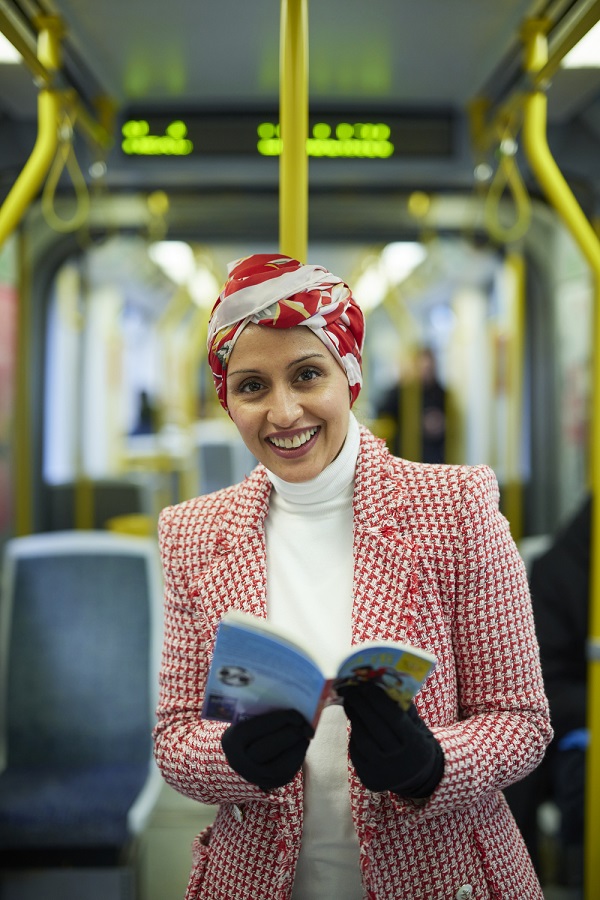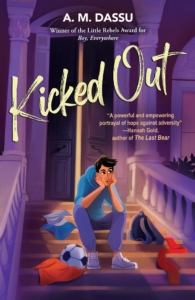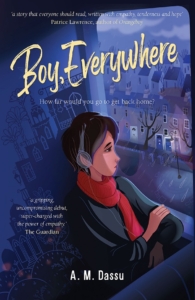
An interview with A. M. Dassu
A.M. Dassu won acclaim and attention with her debut novel, Boy, Everywhere which was shortlisted for the Waterstones Children’s Book Prize and won the Little Rebels Award for Radical Fiction. Her new book, Kicked Out, continues the story of the characters in Boy, Everywhere. Fen Coles spoke to her for Books for Keeps.
 Az Dassu never intended to write a novel. She saw herself as a picture book author; she even owns a few manuscripts. But witnessing the portrayal of refugees in the media provoked, she says, a passionate response in her and she ‘couldn’t let it go’. The result was her powerful middle grade debut, Boy, Everywhere published in 2020, winner of the 2021 Little Rebels Award for Radical Children’s Fiction.
Az Dassu never intended to write a novel. She saw herself as a picture book author; she even owns a few manuscripts. But witnessing the portrayal of refugees in the media provoked, she says, a passionate response in her and she ‘couldn’t let it go’. The result was her powerful middle grade debut, Boy, Everywhere published in 2020, winner of the 2021 Little Rebels Award for Radical Children’s Fiction.
This October sees the publication of the follow-up, Kicked Out, and a return to the same friendship group of Boy Everywhere, now from the perspective of 13-year-old Ali. She confesses, ‘I actually never planned to write a sequel’, but when asked to pitch a book for World Book Day 2023 (resulting in Boot It!), ‘Ali’s story spoke to me; it was literally visceral.’
Like her two previous novels, Kicked Out deftly layers up a range of weighty and complex issues: racism, bullying, absent parents, coercive control. But, as with Boy, Everywhere, the text’s most urgent engagement is with the UK’s treatment of refugees and asylum seekers. As always, Az’s research has been sensitive, meticulous and thorough. And it’s needed to be. The intervening years have seen huge shifts in the UK’s asylum process and in its treatment of unaccompanied minors. A conversation Az had with the Baca Charity, who support young asylum seekers, inspired perhaps the starkest storyline in Kicked Out. At just 16-years-old, Aadam, a Syrian refugee, is ‘aged up’ by the Home Office to 25, thereby threatening his deportation appeal. This is an extraordinarily contemporary referencing. How does Az keep her writing so up to date in the face of these rapid changes? She admits, ‘I really did struggle more with the research this time…with Boy, Everywhere I was starting afresh; with Kicked Out I was coming at it more informed, more connected.’ Rooted in a more solid knowledge base made writing it, she felt, somehow more challenging. But then again, ‘So much has changed and so much has not changed. …The rhetoric is [still] so divisive and so dangerous…demonising and criminalising refugees and asylum seekers’; it leaves her feeling ‘really terrified’.
With Boy, Everywhere, the reader came away with the certain understanding that ‘This experience [becoming a refugee] could happen to any  of us -’, an awareness which she feels was truly brought home by the Ukrainian refugee crisis. With Kicked Out, this empathetic kickstart remains but now also extends into something more galvanising: ‘- but this is what we can do.’ A superb back note offers a rainbow of acts of resistance. These range from the quiet – reaching out with a smile or a kind word – to the clamorous – organising a school assembly, calling in to radio stations. Az wants to raise awareness with every fibre of her being but she never wants to leave her audience in despair, ‘I want people to be empowered… to express their opinion on this if they wish to. And if they don’t wish to, it’s fine. I think support is powerful in silence, just in being there, in being an ally. Or you can do the marching. It’s your choice. There are many forms of being political.’
of us -’, an awareness which she feels was truly brought home by the Ukrainian refugee crisis. With Kicked Out, this empathetic kickstart remains but now also extends into something more galvanising: ‘- but this is what we can do.’ A superb back note offers a rainbow of acts of resistance. These range from the quiet – reaching out with a smile or a kind word – to the clamorous – organising a school assembly, calling in to radio stations. Az wants to raise awareness with every fibre of her being but she never wants to leave her audience in despair, ‘I want people to be empowered… to express their opinion on this if they wish to. And if they don’t wish to, it’s fine. I think support is powerful in silence, just in being there, in being an ally. Or you can do the marching. It’s your choice. There are many forms of being political.’
We talk about the risks a creator takes when representing marginalised voices. In a bid to counter hateful stereotypes of refugees, authors run the risk of echoing very different, but still troubling, tropes: Victims or Good Immigrants. This is something Az is acutely aware of from discussions she’s had with Nadine Kaadan, a UK-based Syrian children’s creator. Az’s characters are always finely and studiously drawn. They are never perfect, are variously flawed. And, both Sami’s family and Aadam are shown doing some things ‘illegally and knowingly’ (Aadam, for example works for cash-in-hand). She is honest with that. But she is also crystal clear on this – our often inhumane systems mean that asylum seekers sometimes do have to break laws, simply in order to survive.
It may be surprising to learn from this account that Kicked Out is as consciousness-raising as it is reassuring and entertaining. Az bears a huge sense of responsibility towards her young readers. She recognises that her body of work is political and ‘blames’ her Little Rebels Award win for strengthening that motivation (she also cites the influences of works by Malorie Blackman and Patrice Lawrence). But, she is always careful to imbue her readers with the profound belief that they can be agents of change. And her novels are full of warmth. At the core of Kicked Out is a wonderfully supportive friendship group, Ali and ‘his boys’, Sami and Mark. ‘I wanted to show [boys] how you can lean on your friends; you can be open; you can talk. I wanted boys who want to do that to feel seen but I also want other boys to see that it’s okay to do that. They’re still a cool group of friends!’
This is classic Az. She gives permission to her readers to express themselves and with the upmost authenticity and often, also, with humour. She says that in previous novels she used her secondary characters to carry the novel’s lighter scenes – Sukhi in Fight Back and Ali in Boy, Everywhere. But now, Ali is centre stage. She highlights a scene in which classmate Nathan accuses Ali and his friends of raising money, not for Aadam’s legal fees, but for ISIS. The boys collapse about laughing. Az says her editors were momentarily taken aback with this response to overt racism. But, as Az says, ‘you do laugh at stereotypes; you do; you’re not going to cry all the time. What are you going to do except to laugh?’ This is a strong, affirming nod from Az to readers of her books who may be on the receiving end of discrimination and who know, absolutely, how this humour can ‘work’ for them.
Az’s connection with her Kicked Out readers is also strikingly evident in the description of Ali’s family dynamics. Raised by his mum, Ali’s feelings about his absent dad are conflicting, an inner chaos which is heightened when he suddenly reappears. For this portrayal, Az drew on a recent conversation she’d had which ‘made me realise that the impact of having an absent father shows up at some point.’ This fresh understanding of hers gave rise to a strong desire to empower her young readers in a similar situation. It sounds as if she wants to equip them, almost in advance, for the strong emotions they might encounter later on in life. And she has certainly succeeded in that.
Near the end of the interview, Az reflects, ‘I really connected with Ali.’ This echoes something she said at the very start: ‘I write boys quite easily. I think I’m a 13-year-old boy.’ And then, she’s laughing again. In response to the question ‘What are you working on next?’, she exclaims, ‘Not a novel! I’ve found every single one extremely draining. I write with so much responsibility that I panic a lot, about authenticity, about research fact checking – it’s not easy.’ Her commitment to truth telling is a real gift to her readership. So it is entirely forgivable that she might choose some less weighty content next time around. She hints, strongly, at a possible younger reader for ages 7-9 and one, maybe two, picture books. We’re back to those early manuscripts … She can’t reveal much but says, ‘I want to show people my fun side.’ It seems as if her inner-Ali is really going to come out, with flamboyance and, yes, with fun!
Fen Coles is co-director of Letterbox Library.
Kicked Out and Boy, Everywhere are published by Old Barn Books, £7.99 pbk





